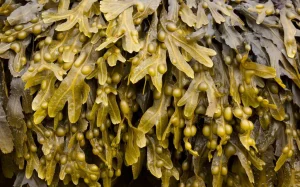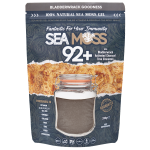BLADDERWRACK
BLADDERWRACK

Bladderwrack is an ingredient in our Bladderwrack Goodness blend, below you will find fascinating information and key benefits about this ingredient.
Bladderwrack is a type of seaweed, rich in antioxidants and iodine. It is most used to promote thyroid health and natural collagen production. It is also a very effective anti-inflammatory and can lower the risk of heart disease and high blood sugar.
Derived from the large species of algae called fucus vesiculosus, bladderwrack is a seaweed that can grow up to 35 inches (90 cm) tall. It can be found on the coastlines of the Atlantic and Pacific Oceans, the Baltic and North Seas and within some waters in Canada and the US.
Bladderwrack is packed full of antioxidants, fibre, vitamins and minerals, so it has been used in both traditional medicine and as a food source in some cultures for centuries. The Romans apparently used it to treat joint pains and tuberculosis. It also contains high levels of iodine, which makes it great for thyroid health, metabolism regulation and the prevention of goitres.
As well as being full of antioxidants, bladderwrack also has anti-inflammatory properties. Studies have shown that consuming seaweed like bladderwrack can significantly reduce the risk of heart disease and help control blood sugar levels. The antioxidants found in bladderwrack also promote healthy collagen production in human skin, making it great for reducing the appearance of ageing skin, cellulite and burns.
For most people, bladderwrack is safe to use but it should be noted that it interacts with certain types of medication. It can slow blood clotting, so be careful of using it alongside anticoagulants. It also interacts with antithyroid medications. When taken in combination with the iodine levels in bladderwrack, the thyroid may be decreased too much, so it’s best avoided if you’re taking medication for an overactive thyroid.
Key benefits of bladderwrack include:
- Blood Sugar Control: Certain compounds in bladderwrack can help regulate blood sugar levels and improve insulin sensitivity.
- Bone Health Support: Bladderwrack contains several minerals, including calcium and magnesium, which are essential for bone health and can contribute to maintaining strong and healthy bones.
- Gut Health Promotion: Bladderwrack is a good source of dietary fibre, which supports digestive health by promoting regular bowel movements and supporting the growth of beneficial gut bacteria. The alginic acid also helps to improve the texture of stools, facilitating its evacuation.
- Skin Health Benefits: The antioxidant and anti-inflammatory properties of bladderwrack can contribute to its benefits for skin health, including moisturising, anti-ageing, and wound healing effects.
- Thyroid Support: Bladderwrack is rich in iodine, which is essential for proper thyroid function. Adequate iodine intake helps support the production of thyroid hormones, which regulate metabolism, growth, and development.
- Weight Management Support: The compounds found in bladderwrack, such as alginate can aid in weight management by promoting fat metabolism and improving blood sugar levels.
Avoid bladderwrack if taking the following medications:
- Thyroid Medications: Bladderwrack contains high levels of iodine, which may affect thyroid function. Combining bladderwrack with thyroid medications such as levothyroxine could potentially alter thyroid hormone levels and treatment efficacy. Use caution and consult with a healthcare provider.
- Anticoagulants and Antiplatelet Drugs: Bladderwrack may have blood-thinning properties. Combining it with anticoagulant medications or antiplatelet drugs could increase the risk of bleeding. Use caution and consult with a healthcare provider.
- Hypertension Medications: Bladderwrack may contain compounds that affect blood pressure. Combining it with medications used to treat hypertension could potentially enhance or interfere with blood pressure regulation. Monitor blood pressure closely and consult with a healthcare provider.
- Diabetes Medications: Bladderwrack may affect blood sugar levels. Combining it with diabetes medications could potentially enhance the medications' effects, leading to hypoglycaemia (low blood sugar). Monitor blood sugar levels closely and consult with a healthcare provider.
- Lithium: Bladderwrack may interact with lithium, a medication used to treat bipolar disorder. Combining bladderwrack with lithium could potentially increase lithium levels in the blood, leading to adverse effects. Use caution and consult with a healthcare provider.
- Thyroid Cancer Treatment: Bladderwrack may interfere with thyroid cancer treatment. Individuals undergoing treatment for thyroid cancer should avoid bladderwrack due to its potential effects on thyroid function and treatment efficacy.
- Immunosuppressants: Bladderwrack may enhance the effects of immunosuppressant medications, increasing the risk of infections or other complications. Combining bladderwrack with drugs like tacrolimus or cyclosporine could weaken the immune system's response. Use caution and consult with a healthcare provider.
Individuals with the following allergies or medical conditions should use caution or avoid bladderwrack:
- Iodine Sensitivity or Allergy: Bladderwrack, a type of seaweed, contains high levels of iodine. Individuals with known iodine sensitivity or allergy may experience allergic reactions, such as skin rash, itching, swelling, or difficulty breathing, upon exposure to bladderwrack.
- Thyroid Disorders: Bladderwrack contains iodine, which is essential for thyroid function. However, excessive iodine intake from bladderwrack may exacerbate thyroid disorders such as hyperthyroidism or hypothyroidism. Individuals with thyroid disorders should use bladderwrack cautiously and under the guidance of a healthcare provider.
- Pregnancy and Breastfeeding: Bladderwrack contains iodine and other compounds that may affect thyroid function. Pregnant or breastfeeding individuals should use caution when consuming bladderwrack, as excessive iodine intake could potentially affect thyroid hormone levels in both the mother and the developing baby. Consult with a healthcare provider before using bladderwrack during pregnancy or lactation.
- Kidney Disorders: Bladderwrack may contain compounds that could potentially affect kidney function. Individuals with kidney disorders or impaired kidney function should use bladderwrack cautiously and consult with a healthcare provider before consumption.
- Gastrointestinal Disorders: Some individuals may experience gastrointestinal discomfort or digestive upset when consuming bladderwrack. This may include symptoms such as bloating, gas, abdominal pain, or diarrhea. Individuals with gastrointestinal disorders such as irritable bowel syndrome (IBS) should use bladderwrack cautiously.
- Blood Clotting Disorders: Bladderwrack may have blood-thinning properties. Individuals with blood clotting disorders or those taking anticoagulant medications should use bladderwrack cautiously to avoid potential interactions or excessive bleeding.
- Scheduled surgery: Individuals scheduled for surgery should avoid bladderwrack due to its blood-thinning effects, high iodine content affecting thyroid function, potential interactions with anaesthesia, and risk of adverse reactions. Inform healthcare providers of bladderwrack use to ensure safe perioperative management and optimize surgical outcomes.
Recommended Products
DIVE DEEPER
Seaweed dry, 100g
Vitamins present |
Value |
Minerals present |
Value |
|---|---|---|---|
|
Vitamin A |
3.1mg - 344% |
Calcium |
1500mg -125% |
|
Vitamin C |
51mg - 56% |
Copper |
1.6µg - 0.17% |
|
|
|
Iodine |
232mcg - 154% |
|
|
|
Iron |
4.2mg - 23% |
|
|
|
Magnesium |
867mg - 270% |
|
|
|
Manganese |
5mg - 277% |
|
|
|
Zinc |
3.7mg - 46% |



